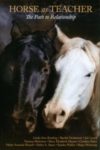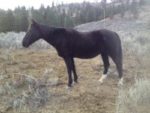CRIBBING- Curing this vice with Nutrition…
By Marijke van de Water
Cribbing is the term we use to describe the behavior wherein horses grasp stationary objects with their upper teeth, arch their necks and swallow or suck in air. Cribbing, although on occasion is habitual and/or behavioral, is almost always a sign of stomach distress.
Horses most often begin to crib in an effort to alleviate stomach discomfort from indigestion, nausea and/or burning. These symptoms are frequently caused by the overfeeding of starches and/or proteins which, over time, creates excess gastric (stomach) fermentation. This hampers both the digestive and buffering capabilities of the stomach and increases levels of unfriendly bacteria and acids damaging the interior of the stomach, resulting in ulcers, gastritis, gas, acid, nausea and feelings of premature fullness.
Not only do horses find the sucked in wind comforting and cooling, but the jaw movement of cribbing buffers and lubricates the upset stomach by inducing saliva production. These gastric cribbers are often observed cribbing during and after eating. Excessive tongue action and licking motions are also signs of stomach discomfort.
Remember that horses can be masters at hiding the true reason for their discomfort. Imagine if you will that you were suffering from heartburn, indigestion, nausea or pain and that you were not only unable to communicate your discomfort to anyone, but that you were also unable to find relief. Depending on your level of frustration, you might pace or paw; you might become restless, irritable, and/or tired; you might lick cool objects and/or inhale cool air deeply and frequently. You might even sink your teeth into a piece of wood to steady yourself in an attempt to seek relief through endorphin production. But then again, a well-meaning friend might cover the wood with metal so that all you can do is lick it. Or someone might wrap a tight collar around your neck to stop you from getting relief from the cool air and from the acid buffering effects of jaw movement. These inhumane practices originate from ignorance about the equine digestive process, and from human misinterpretation of equine behavior, as we fail to understand our horses’ efforts to communicate with us.
Many times I have seen cribbing abruptly stop when horse owners eliminate a particular kind of grain, commercial feed, or hay that is too rich in either protein (e.g. alfalfa) or sugars from the feeding program. These feeds can precipitate cribbing by overloading the capabilities of the equine digestive system. Positive feed changes combined with the appropriate digestive supplements restore digestive function and give a horse long-needed relief.
It is also true that horses can crib as a stress response to stall confinement, boredom, isolation, and/or emotional stress. However, since we know that stress is directly linked to digestive disorders, we must question whether behavioral cribbing is an attempt to alleviate mal-digestion and gastric pain as caused by stress, or if behavioral cribbing is an attempt to alleviate the stress itself, through endorphin production.
There has been no incidence of cribbing reported in wild horse bands. Amazing what a natural diet and a little freedom can do…
Nutritional Cribbing Program – Discontinue all grain, alfalfa and sugar-rich hay
Feed frequently – horses have to chew all day!
Reduce stress levels
RIVA’s REMEDIES TREATMENT PLAN…
• Magnesium Citrate – 3,000 mg daily (buffers excess acid, natural pain reliever, calms stress and nervous tension)
• Pro-Colon (probiotics) – 50,000 – 60,000 billion CFU’s daily (replenishes friendly bacteria, supports digestion & immunity)
• Folic Acid – 9 mg daily (stimulates stomach digestion; helps to heal stomach membranes)
• Gastricol (homeopathic medicine) – One dose (5-10 pump sprays) – twice daily (treats bloating, gas and colic; supports optimum digestion and liver function)
• Calm and Cool herbal blend – add for very nervous cribbers – ¼ cup daily (calms and restores nerves)
Visit www.rivaremedies.com for more information about Cribbing & how to fix the root of the problem…
Marijke van de Water, B.Sc., DHMS
• Equine Health & Nutrition Specialist
• Homeopathic Practitioner
• Medical Intuitive/Healer
• Seminar & Retreat Facilitator
“Helping Horses & Their People”
Marijke has been a Natural Health Practitioner and Energy Healer for nearly two decades. She is a gifted and widely respected healer who uses a blend of exceptional knowledge, modern science, ancient wisdom and medical intuition giving her an uncanny ability to track the underlying causes of unwellness. She uses a variety of modalities to help horses (and their people) including diet, clinical and therapeutic nutrition, homeopathic medicines, energy testing and energy healing.
Marijke is from Armstrong, B.C. where she manages a natural health clinic. She works with horses all over North America formulating wellness programs for a variety of health conditions through the use of feeding programs, nutritional supplements, herbs and homeopathic remedies. She is considered one of the foremost experts in therapeutic nutrition and equine natural medicine with a special interest in digestive disorders, immunity, laminitis, metabolic syndrome and emotional and spiritual wellness. In late 2008 she published her first book, “Healing Horses – Their Way!”, a comprehensive and highly informative book on holistic equine health and horse-keeping.
Marijke has extensive teaching experience and is a popular speaker and clinician at equine conferences and expos. She conducts seminars and classes in equine natural medicine, kinesiology, and animal communication. She also facilitates healing retreats for people. Her continuing research, expert knowledge, and exceptional communication skills have put her in high demand across North America for her informative lectures and successful health practices with horses and people. She also offers individual consultations locally and by long-distance.
Marijke lives with two quarter horse mares, one black and white paint gelding, a Shetland pony who taught her everything she knows, and a miniature cross donkey who loves to be loved. She rides English, Western and bareback and enjoys interacting with her horses through fun-filled horsemanship, good food, intuitive communications, healing and a sharing of the spirit.


